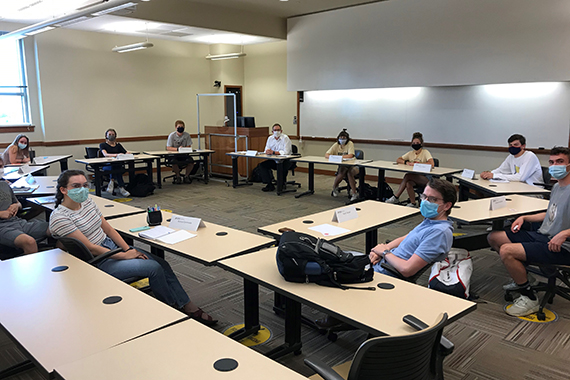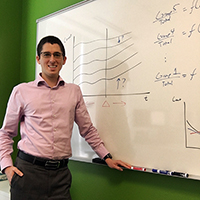 With an average class size of about 12, students in Econ Scholars are able to maintain a safe social distance from one another during course discussions. (Photo by Kevin Mumford)
With an average class size of about 12, students in Econ Scholars are able to maintain a safe social distance from one another during course discussions. (Photo by Kevin Mumford)
Delving Deeper
Econ Scholars course spans a spectrum of topics
A unique Krannert School of Management course called the Economic Scholars Program (ECON 290) is introducing undergraduate students from across Purdue to classical economic literature, best practices for small workshop-style discussions, and how economic theories of the past inform the present.
Econ Scholars is a new course in its third semester and is possible via generous funding from a donor to the Purdue University Research Center in Economics (PURCE). The course is intentionally kept small, at around 12 students, to foster in-depth conversation about demanding topics.
“It was these discussions with my peers that I found most valuable about the course,” says Krannert student Kijune Kim, who took Econ Scholars in spring 2020. “Our group was diverse in thought, which allowed for respectful debates. Specifically, the topic of taxes and the role of government was easily my favorite one that we dived deeper into.
“Fostering this ability to converse, disagree, step back and try our best to understand the opposing views within our small group is what distinguished this educational experience from the large room lectures that I had been used to,” Kim says.
Undergraduate students from any major who have taken ECON 251 can apply to take the 1-credit hour course by submitting an essay and their transcripts. Selected students each receive a $1,000 scholarship upon successful completion of Econ Scholars, and as an added perk the weekly evening class serves its students dinner (in fall 2020, due to Covid-19, students were given gift cards for local eateries).
“The Econ Scholars Program grew out of a desire for students from the engineering, science, agriculture, or any of the other colleges across Purdue to be able to delve deeper into economic theory. Students get to experience how relevant some economic concepts, first developed 200 years ago, are to public policy today,” says PURCE Kozuch Director Kevin Mumford, Krannert associate professor of economics.
This mission is getting across to the students. In spring 2020, with Krannert Economics Lecturer Robert Holland at the helm, the scholars read works by French economist Frédéric Bastiat (1801-1850).
Thanks to Econ Scholars, “I not only can say I’ve read many excepts from Bastiat’s Economic Sophisms, but I can also say that I have found a deeper understanding of the economics of the society in which we live,” says Krannert undergraduate Brien Rissman.
Most memorable about Rissman’s Econ Scholars course was “being able to talk about economic theory and how it can apply to the real world. In my economics curriculum at Purdue, I have focused more on the analytical side of economics, mainly because it is easier to make decisions about what’s best when you have numbers to support it. But this opportunity expanded that.”
Being able to focus on the course’s readings, which are a mix of classic econ texts and current journal and news articles, and then discussing them, is a highlight of Econ Scholars.
“I feel the most valuable part about this course was the ability to discuss economics without worrying about exams,” says College of Pharmacy student Kendra Antoskiewicz, also in Bob Holland’s spring 2020 class. “I was able to grasp concepts easier and contribute my own thoughts. I loved the fire some of my fellow scholars had and I learned a lot from them.”
The current iteration of Econ Scholars finds David Hummels, the Samuel R. Allen Dean and Distinguished Professor of Economics in the Krannert School of Management, focusing on the future. His fall 2020 Economic Scholars Program course “The Future of…” looks at how work, consumption, privacy, cities, and universities are being reshaped by the pandemic and other forces. His texts are the 2016 book The Industries of the Future by Alec Ross, a technology policy expert, and Bastiat’s Economic Sophisms and Economic Harmonies -- as well as several academic journal articles.
Hummels says Econ Scholars is one of the most enjoyable courses he’s taught at Purdue. His students come prepared to challenge their preconceptions and wrestle with new ideas.
“One way to understand how the economy might look different in the future is to understand how much it has changed in the last two centuries,” Hummels says. “Reading how leading thinkers from the 19th and 20th centuries grappled with forward-looking problems provides a context for our analysis.
“A class like this provides a real freedom to switch modes of analysis, and to see how different students respond and are convinced, or not, by different styles. Some really respond to cleverly constructed prose, others see best using modern graphical analysis, still others want hard numbers. As we go back and forth, we traverse centuries in the history of economic thought and persuasion.”






